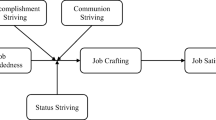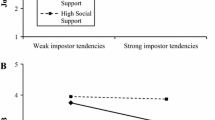Abstract
Goal orientation has become one of the most studied motivational constructs in the psychology literature. However, in organizational contexts, the research focus to date has largely centered on the relationship between goal orientation and task performance—neglecting the valuable contribution of non-task work behaviors, such as workplace deviance and organizational citizenship behavior (OCB) to organization functioning. In this paper, we addressed this gap in the literature by investigating the differential prediction of performance approach and mastery approach goal orientation on workplace deviance and OCB, beyond personality correlates. We hypothesize that performance approach orientation is positively associated with workplace deviance and mastery approach orientation is positively associated with OCB. A sample of employed participants (n = 114) provided self-reports of goal orientation, workplace deviance, OCB and personality. Additionally, participants nominated a well-acquainted peer to provide peer-reports of their personalities. When controlling for personality, performance approach orientation positively predicted workplace deviance whereas mastery approach orientation positively predicted organizational citizenship behavior. This study is the first to our knowledge to explore the relationships between goal orientation and non-task work behaviors and to show that goal orientation adds to the understanding of workplace deviance and OCB, beyond personality. Practical implications and directions for future research are discussed.
Similar content being viewed by others
Notes
We ran additional regression analyses which confirmed that mastery approach was responsible for the suppression effect. We thank an anonymous reviewer for identifying this result.
References
Ames, C., & Archer, J. (1987). Mothers’ beliefs about the role of ability and effort in school learning. Journal of Educational Psychology, 79(4), 409.
Ashton, M. C., & Lee, K. (2001). A theoretical basis for the major dimensions of personality. European Journal of Personality, 15(5), 327–353.
Ashton, M. C., Lee, K., Perugini, M., Szarota, P., De Vries, R. E., Di Blas, L., & De Raad, B. (2004). A six-factor structure of personality-descriptive adjectives: solutions from psycholexical studies in seven languages. Journal of Personality and Social Psychology, 86(2), 356.
Baranik, L. E., Barron, K. E., & Finney, S. J. (2007). Measuring goal orientation in a work domain. Educational and Psychological Measurement, 67(4), 697–718. doi:10.1177/0013164406292090.
Baumeister, R. F., & Tice, D. M. (1985). Self-esteem and responses to success and failure: Subsequent performance and intrinsic motivation. Journal of Personality, 53(3), 450. doi:10.1111/1467-6494.ep8970306.
Bell, B. S., & Kozlowski, S. W. J. (2002). Goal orientation and ability: Interactive effects on self-efficacy, performance, and knowledge. Journal of Applied Psychology, 87(3), 497–505.
Bennett, R. J., & Robinson, S. L. (2000). Development of a measure of workplace deviance. Journal of Applied Psychology, 85(3), 349–360.
Bipp, T., Steinmayr, R., & Spinath, B. (2008). Personality and achievement motivation: Relationship among Big Five domain and facet scales, achievement goals, and intelligence. Personality and Individual Differences, 44(7), 1454–1464. doi:10.1016/j.paid.2008.01.001.
Borman, W. C., & Motowidlo, S. J. (1993). Expanding the criterion domain to include elements of contextual performance. In N. Schmitt & W. C. Borman (Eds.), Personnel selection in organizations (pp. 71–98). San Francisco: Jossey-Bass.
Borman, W. C., Penner, L. A., Allen, T. D., & Motowidlo, S. J. (2001). Personality predictors of citizenship performance. International Journal of Selection and Assessment, 9(1–2), 52–69.
Cellar, D., Stuhlmacher, A., Young, S., Fisher, D., Adair, C., Haynes, S., & Riester, D. (2011). Trait goal orientation, self-regulation, and performance: A meta-analysis. Journal of Business and Psychology, 26(4), 467–483. doi:10.1007/s10869-010-9201-6.
Colbert, A. E., Mount, M. K., Harter, J. K., Witt, L. A., & Barrick, M. R. (2004). Interactive effects of personality and perceptions of the work situation on workplace deviance. Journal of Applied Psychology, 89(4), 599.
Costa, P. T., & McCrae, R. R. (1992). Four ways five factors are basic. Personality and Individual Differences, 13(6), 653–665.
Detert, J. R., Trevino, L. K., Burris, E. R., & Andiappan, M. (2007). Managerial modes of influence and counterproductivity in organizations: A longitudinal business-unit-level investigation. Journal of Applied Psychology, 92(4), 993–1005.
Digman, J. M. (1990). Personality structure: Emergence of the five-factor model. Annual Review of Psychology, 41(1), 417–440.
Dinger, F. C., Dickhäuser, O., Hilbig, B. E., Müller, E., Steinmayr, R., & Wirthwein, L. (2015). From basic personality to motivation: Relating the HEXACO factors to achievement goals. Learning and Individual Differences, 40, 1–8. doi:10.1016/j.lindif.2015.03.023.
Dragoni, L. (2005). Understanding the emergence of state goal orientation in organizational work groups: The role of leadership and multilevel climate perceptions. Journal of Applied Psychology, 90(6), 1084–1095. doi:10.1037/0021-9010.90.6.1084.
Dragoni, L., & Kuenzi, M. (2012). Better understanding work unit goal orientation: Its emergence and impact under different types of work unit structure. Journal of Applied Psychology, 97(5), 1032.
Dunlop, P. D., & Lee, K. (2004). Workplace deviance, organizational citizenship behavior, and business unit performance: The bad apples do spoil the whole barrel. Journal of Organizational Behavior, 25(1), 67–80.
Dunlop, P. D., Morrison, D. L., Koenig, J., & Silcox, B. (2012). Comparing the Eysenck and HEXACO models of personality in the prediction of adult delinquency. European Journal of Personality, 26(3), 194–202.
Elliot, A. J. (1999). Approach and avoidance motivation and achievement goals. Educational Psychologist, 34, 169–189. doi:10.1207/s15326985ep3403_3.
Elliot, A. J., & Church, M. A. (1997). A hierarchical model of approach and avoidance achievement motivation. Journal of Personality and Social Psychology, 72(1), 218.
Elliot, A. J., & McGregor, H. A. (2001). A 2 × 2 achievement goal framework. Journal of Personality and Social Psychology, 80(3), 501–519.
Elliot, A. J., & Moller, A. C. (2003). Performance-approach goals: Good or bad forms of regulation? International Journal of Educational Research, 39(4–5), 339–356. doi:10.1016/j.ijer.2004.06.003.
Griffin, R. W., & Lopez, Y. P. (2005). “Bad Behavior” in organizations: A review and typology for future research. Journal of Management, 31(6), 988–1005. doi:10.1177/0149206305279942.
Harris, A., Yuill, N., & Luckin, R. (2008). The influence of context-specific and dispositional achievement goals on children’s paired collaborative interaction. British Journal of Educational Psychology, 78(3), 355–374. doi:10.1348/000709907X267067.
Kozlowski, S. W. J., & Bell, B. S. (2006). Disentangling achievement orientation and goal setting: Effects on self-regulatory processes. Journal of Applied Psychology, 91(4), 900–916. doi:10.1016/s0021-9010(06)61900-6.
Lee, K., & Allen, N. J. (2002). Organizational citizenship behavior and workplace deviance: The role of affect and cognitions. Journal of Applied Psychology, 87(1), 131–142.
Lee, K., & Ashton, M. C. (2004). Psychometric properties of the HEXACO personality inventory. Multivariate Behavioral Research, 39(2), 329–358.
Lee, K., Ashton, M. C., & Shin, K. H. (2005). Personality correlates of workplace anti-social behavior. Applied Psychology, 54(1), 81–98.
McCrae, R. R., & Costa, P. T. (1987). Validation of the five-factor model of personality across instruments and observers. Journal of Personality and Social Psychology, 52(1), 81–90.
Motowidlo, S. J., & Van Scotter, J. R. (1994). Evidence that task performance should be distinguished from contextual performance. Journal of Applied Psychology, 79(4), 475.
O’Neill, T. A., Lewis, R. J., & Carswell, J. J. (2011). Employee personality, justice perceptions, and the prediction of workplace deviance. Personality and Individual Differences, 51(5), 595–600.
Ogunfowora, B., Bourdage, J. S., & Nguyen, B. (2013). An exploration of the dishonest side of self‐monitoring: Links to moral disengagement and unethical business decision making. European Journal of Personality.
Ones, D. S., Viswesvaran, C., & Schmidt, F. L. (1993). Comprehensive meta-analysis of integrity test validities: Findings and implications for personnel selection and theories of job performance. Journal of Applied Psychology, 78(4), 679.
Organ, D. W. (1988). Organizational citizenship behavior: The good soldier syndrome. Lexington Books/DC Health and Com.
Organ, D. W. (1990). The motivational basis of organizational citizenship behaviour. Research in Organizational Behavior, 12(1), 43–72.
Organ, D. W. (1997). Organizational citizenship behavior. It’s construct clean-up time. Human Performance, 10(2), 85–97.
Organ, D. W., Podsakoff, P. M., & MacKenzie, S. B. (2006). Organizational citizenship behavior: Its nature, antecedents, and consequences. Thousand Oaks: Sage.
Organ, D. W., & Ryan, K. (1995). A meta-analytic review of attitudinal and dispositional predictors of organizational citizenship behavior. Personnel Psychology, 48(4), 775–802.
Payne, S. C., Youngcourt, S. S., & Beaubien, J. M. (2007). A meta-analytic examination of the goal orientation nomological net. Journal of Applied Psychology, 92(1), 128–150. doi:10.1037/0021-9010.92.1.128.
Poortvliet, P. M., Anseel, F., Janssen, O., Van Yperen, N. W., & Van de Vliert, E. (2012). Perverse effects of other-referenced performance goals in an information exchange context. Journal of Business Ethics, 106(4), 401–414.
Poortvliet, P. M., Janssen, O., Van Yperen, N. W., & Van de Vliert, E. (2007). Achievement goals and interpersonal behavior: How mastery and performance goals shape information exchange. Personality and Social Psychology Bulletin, 33(10), 1435–1447.
Robinson, S. L., & Bennett, R. J. (1995). A typology of deviant workplace behaviors: A multidimensional scaling study. Academy of Management Journal, 38(2), 555–572.
Salgado, J. F. (2002). The Big Five personality dimensions and counterproductive behaviors. International Journal of Selection and Assessment, 10(1–2), 117–125.
Spector, P. (1992). A consideration of the validity and meaning of self-report measures of job conditions. In C. L. Cooper & I. T. Robertson (Eds.), International review of industrial and organizational psychology (pp. 123–151). Chichester, England: Wiley.
Steinmayr, R., Bipp, T., & Spinath, B. (2011). Goal orientations predict academic performance beyond intelligence and personality. Learning and Individual Differences, 21(2), 196–200.
Sujan, H., Weitz, B. A., & Kumar, N. (1994). Learning orientation, working smart, and effective selling. The Journal of Marketing, 58(3), 39–52.
Van Yperen, N. W., Blaga, M., & Postmes, T. (2015). A meta-analysis of the impact of situationally induced achievement goals on task performance. Human Performance, 28(2), 165–182.
Van Yperen, N. W., Hamstra, M. R. W., & van der Klauw, M. (2011). To win, or not to lose, at any cost: The impact of achievement goals on cheating. British Journal of Management, 22, S5–S15. doi:10.1111/j.1467-8551.2010.00702.x.
Vardi, Y., & Weitz, E. (2004). Misbehavior in organizations. Mahwah, NJ: Lawrence Erlbaum.
Weller, J. A., & Thulin, E. W. (2012). Do honest people take fewer risks? Personality correlates of risk-taking to achieve gains and avoid losses in HEXACO space. Personality and Individual Differences, 53(7), 923–926.
Yeo, G. B., Loft, S., Xiao, T., & Kiewitz, C. (2009). Goal orientations and performance: Differential relationships across levels of analysis and as a function of task demands. Journal of Applied Psychology, 94(3), 710. doi:10.1037/a0015044.
Yeo, G. B., & Neal, A. (2008). Subjective cognitive effort: A model of states, traits, and time. Journal of Applied Psychology, 93(3), 617–631. doi:10.1037/0021-9010.93.3.617.
Yeo, G. B., Sorbello, T., Koy, A., & Smillie, L. D. (2008). Goal orientation profiles and task performance growth trajectories. Motivation and emotion, 32(4), 296–309.
Author information
Authors and Affiliations
Corresponding author
Rights and permissions
About this article
Cite this article
Louw, K.R., Dunlop, P.D., Yeo, G.B. et al. Mastery approach and performance approach: the differential prediction of organizational citizenship behavior and workplace deviance, beyond HEXACO personality. Motiv Emot 40, 566–576 (2016). https://doi.org/10.1007/s11031-016-9551-0
Published:
Issue Date:
DOI: https://doi.org/10.1007/s11031-016-9551-0




